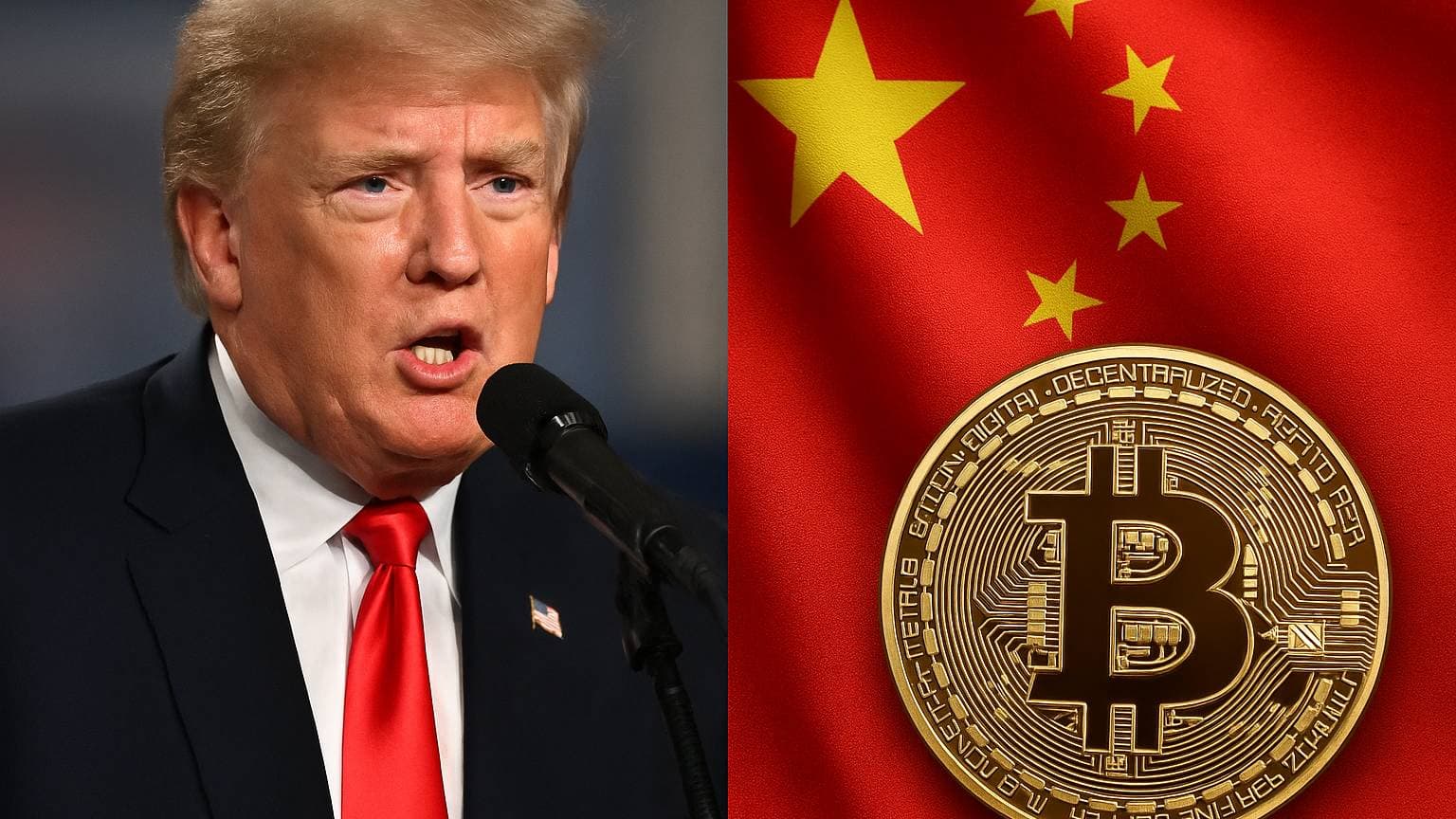Market Meltdown After Tariff Threats
Crypto markets entered turmoil late Monday after former U.S. president Donald Trump announced a sweeping plan to impose 100% tariffs on Chinese exports, reigniting fears of a full-scale trade war.
The announcement sent risk assets tumbling. Bitcoin dropped over 8% in 24 hours, Ethereum fell nearly 4%, and XRP slid 6%. Derivatives exchanges saw over $19 billion in long positions liquidated, marking one of the largest single-day wipeouts since March 2023.
Altcoins mirrored the sell-off. Solana and Avalanche lost more than 10% intraday, while meme tokens like DOGE and PEPE saw sharp drawdowns as retail traders scrambled to unwind leveraged bets.
Liquidity thinned across major exchanges within minutes of the tariff announcement, amplifying volatility. Analysts called the cascade “a macro-triggered liquidity crunch”—the moment global policy collided directly with crypto leverage.
China Responds With Mixed Signals
Beijing confirmed it remains in “working-level discussions” with U.S. officials but condemned the tariff plan as an “unfriendly act.”
A spokesperson for the Ministry of Commerce said China would “fight to the end if necessary, but keep the door open for talks,” underscoring the country’s dual-track approach: strategic defiance coupled with diplomatic caution.
Markets interpreted the statement as non-escalatory but defensive—enough to calm equities briefly, though crypto remained under pressure through the Asian session.
As one Hong Kong-based derivatives trader told local media, “Bitcoin has become the proxy for geopolitical stress. Every headline about China now hits liquidity before it hits stocks.”
How Macro Shockwaves Rip Through Crypto
1. From Hedge to Risk Asset
Once viewed as digital gold, Bitcoin is increasingly trading as a high-beta macro asset, moving in tandem with equities and global risk sentiment.
As capital flees uncertainty, crypto behaves less like a hedge and more like a leveraged reflection of macro anxiety.
2. The $19 Billion Liquidation Chain
Data from major futures platforms shows cascading stop-outs across Binance, OKX, and Bybit. Overexposed traders holding long positions were liquidated as prices fell through support zones near $108,000 for BTC and $3,850 for ETH.
Analysts say the event mirrors “March 2020 mechanics in fast-forward”—when leverage met macro shock and liquidity vanished.
3. Regulators See a Narrative Opportunity
In Washington and Brussels, policymakers may use this meltdown to push for tighter derivatives oversight, citing systemic risk.
EU finance officials have already hinted that unregulated leverage could violate MiCA’s new prudential guidelines when marketed to retail traders.
Find realtime crypto prices and data here.
Trump’s Political Chess and Market Psychology
The tariffs serve dual purposes: an election-season power statement and leverage in upcoming U.S.–China economic talks.
While Chinese officials have avoided direct escalation, Trump’s base views the move as proof of economic toughness.
For markets, the message is uncertainty. Tariffs on key imports—from chips to electric vehicles—could worsen supply chain inflation, forcing investors to reprice both commodities and digital assets.
Crypto’s rapid sell-off reflects this repricing. Traders are no longer just responding to on-chain data or ETF flows—they’re trading foreign-policy risk in real time.
ETF Flows and Institutional Reaction
Exchange-traded Bitcoin products saw immediate outflows following the tariff news, reversing weeks of steady inflows tied to institutional accumulation.
Fund managers paused allocations, citing “macro visibility risk.”
Meanwhile, volatility indexes for digital assets spiked to their highest levels since early summer, prompting hedge funds to re-enter short-volatility strategies designed for turbulent markets.
Still, some institutional desks view this as a buy-the-fear setup—a chance to reload Bitcoin near support if trade negotiations resume or tariffs are delayed.
Speculative Outlook: Trade War or Trade Theatre?
- Fast Resolution Scenario
- If working-level talks stabilize relations, the sell-off could reverse sharply. Bitcoin often rebounds 10–15% after macro shocks once uncertainty fades.
- Tariff Escalation Loop
- A prolonged standoff would entrench risk aversion. Expect tighter liquidity, persistent ETF outflows, and possible stablecoin premium spikes in Asia.
- Regulatory Knock-On Effects
- U.S. and EU regulators may exploit the moment to propose stricter margin and disclosure rules for crypto derivatives—a predictable political reflex when volatility headlines dominate.
- China’s Quiet Leverage
- Some analysts speculate Beijing could use crypto indirectly, easing mining restrictions or boosting yuan-backed stablecoin projects as a symbolic counter to dollar dominance.
What It Signals for Traders
- Macro beats micro. Protocol news and halving cycles mean less when global trade shocks hit.
- Liquidity discipline matters. Overleveraged positions can evaporate faster than headlines change.
- Politics drives volatility. Crypto’s global exposure means every tariff, election, or policy statement can alter risk appetite overnight.
For long-term investors, the message is caution with optionality: volatility is opportunity only for those still solvent.
Market Takeaways
- Trump’s 100% tariff plan on China triggered a $19 B crypto liquidation wave.
- Beijing’s “talk and resist” strategy kept the crisis contained but not resolved.
- Bitcoin now trades as a macro barometer, not a hedge.
- ETF flows turned negative after weeks of steady accumulation.
- Expect more regulation and volatility until trade signals stabilize.
Stay on top of the market with lastes update from HodlHorizon.com.

